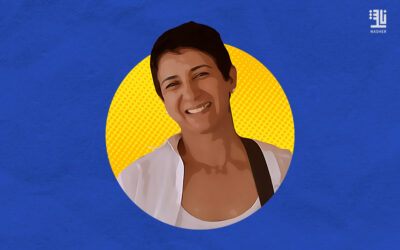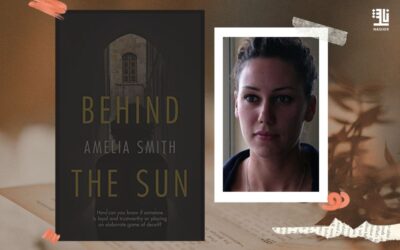From the very nascent days in his creative journey, Tunisian writer and teacher, Kamel Riahi, chose to leave a gaping wound in the face of life. Often compared to a literary surgeon, who, through works The Scalpel, Gorilla and others, has voiced the reality of marginalised classes in Tunisian society – one often afflicted disease, illnesses and dismal crises.
In an interview with Nasher, Riahi speaks openly about the Arab creative experience from a reader’s perspective, the crisis of Arab intellectual and the challenges of the Arab publisher. He also highlights the influence of modern media and technology on the region’s cultural action.
The Western world has developed numerous systems to support writers, mainly the literary agent and the editor. Does their experience serve the final creative product, and what are obstacles hindering the development of such systems in the Arab world?
Literary agents and editors have been known to us since the times of Henry Miller and Bukowski back in the 1950s or even before that. They are the key elements within the publishing process and publishing institutions. They act as necessary filters, ensuring that the quality of literary works match global standards disallowing inferior quality literature from being published. Novels, especially in the US, have been written in the shortest time possible due to the presence of prominent editors. Meanwhile, the literary agent has dealt with several significant issues, copyrights for instance, especially in case of translations or adaptations of a work into cinema or theater.
These professions do not exist in the Arab world, which has led to a two-pronged problem. On the one hand, our publishing market is rife with below average books, and on the other, the non-existence of these professions has led to increasing writers complaining about their rights being denied by publishers. It has also caused a slump in the translation movement and TV, film and theater adaptations.
Publishers think that a literary editor will cost them a lot. What they do not understand is that having one could save them from publishing a lot of average works, which remain in their stores because they are not reviewed by experts. Here I am taking into consideration reading committees, if any, which cannot substitute for a professional reviewer and editor.
Arab cultural projects do not stop support the emerging concept of what is being called ‘The Age of the Novel’. Do you think that reading novels is enough to develop well-educated generations?
I think that the novel, cinema and theater are the main pillars of what we now call culture, since all other forms of art including fine art and other literary genres are embodied in them. As movie and theater are unfortunately still not available to everyone, reading novels becomes an effective low-cost strategy to raise awareness. It is a powerful source of knowledge and has managed to resist all forms of eliminating it since Nicolas Boileau (1636–1711) until today, remaining steadfast, and proving those people who expected it to perish, wrong.
What is your opinion of the common notion that Arabs do not read?
The habit and practice of reading is undergoing a real crisis in the Arab world, and I cannot deny it. The question that arises here is: What have we done to reverse this process? I believe not much. We release books at book fairs and launch TV channels every day, but do quite little for the book itself. We still promote the link between reading and school education, which we believe is the only one that exists – and this makes reading undesirable to many, especially the younger general generation. Most Arab countries have not yet launched real long-term projects designed to ignite a passion for reading, which is the need of the hour. The impact of a lacking culture of reading is clearly seen on young people who seem lost. The solution, in my opinion, is to start shows on television that promote culture and knowledge, offering nourishment to young minds in the Arab countries that they so desperately need. By doing this, we will be able to establish a community where reading is a daily practice and not a temporary one. We also need to rebuild the image of the writer away from the one that has been promoted by the Arab media for decades: the one that shows authors and literary figures as failures afflicted by bad luck, hunger, and sometimes even insanity.
The Tunisian society is often the protagonist in your novels. Do you think the written word is the medium through which the voices of the marginalised will be heard?
We are all living in a state of alienation where our people suffer from ignorance, hatred and false complexes. Often, the novel seems to be the only whistleblower upholding the truth – sometimes more accurate than history books and news channels who delve into imagined stories and illusions. This reminds me of Abdul Rahman Munif’s anecdote that future Arab generations will need to read the novel to know their history.
The novel functions as a powerful refuge and a haven of expression for the marginalised. Therefore, I deem it as our duty to make the novel one of the most traded commodities among people.
In fact, the core source of inspiration for my novels, The Scalpel and Gorilla came when I dived deep into the intellectual structure of the Tunisian society. The overarching theme of Scamp’s Mistresses too deals with dismantling the structure of thinking in Tunisian society, and then delves into its social ills and corruption.
The popularity of visual media is unsurpassed, globally. Why then do cultural materials are shared so frugally on Arab visual media? Is that the reason for its very few successful experiences?
The Arab media has yet to start truly depending on culture as a fundamental pillar on which to build and strengthen the cultural conscience of Arab people. The Arab community at large need to stay focused on the path to cultural liberation, which will be the most effective way for preserving our identity. We have to be wise and steer clear of windows that open up to content that has no literary or cultural value. For instance, we need to incorporate into our visual media, outstanding cultural programs like “large library” or “l’Apostrophe”, which are shown on French television.
Modern theories of knowledge discuss the realm that lies beyond reading, citing audiovisual and other channels of knowledge dissemination. What do you think about this emerging trend? Is it possible to establish a creative enterprise merging the written word with audiovisuals?
Visual and audio materials are powerful channels, but they will not or cannot supersede reading and writing in general – just by virtue of their individual identities and distinct functionalities in the process of knowledge transmission and dissemination. New innovative technologies are being discovered and shared every day, and alliances between written content and audiovisuals are being forged to enhance the reader’s overall experience making it more memorable, more attractive. People who are developing these technologies, from east to west, depend heavily on reading themselves. Therefore, the intention is never for one to supersede but complement each other. These alliances must be smart, and visual means must be used to serve and enhance the written word.







